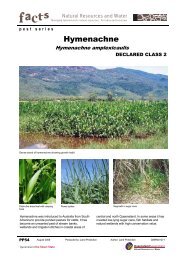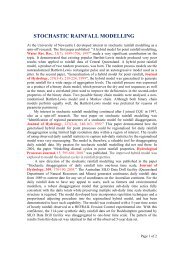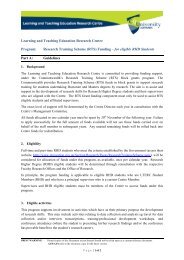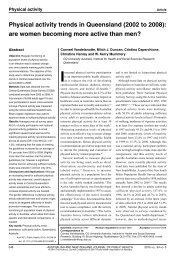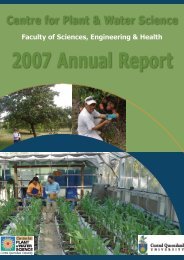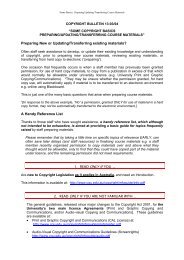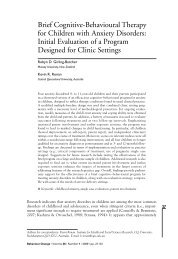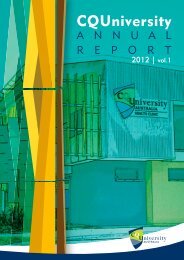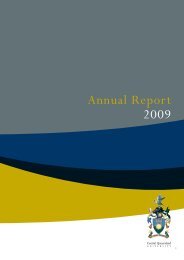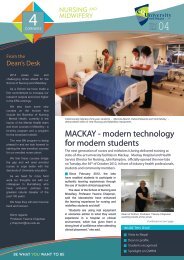Annual Report 2008 - Central Queensland University
Annual Report 2008 - Central Queensland University
Annual Report 2008 - Central Queensland University
Create successful ePaper yourself
Turn your PDF publications into a flip-book with our unique Google optimized e-Paper software.
Corporate<br />
Governance<br />
Freedom of Information Act 1992<br />
www.cqu.edu.au/compliance/FOI<br />
The purpose of the Freedom of Information Act 1992 (Qld), is to extend as far as<br />
possible the right of the community to have access to information held by the<br />
<strong>Queensland</strong> Government, including Statutory Authorities such as Universities. As<br />
required under s18 of the Act, the <strong>University</strong> publishes a Statement of Affairs on its<br />
policy website annually, providing information on the types of documents produced<br />
by the <strong>University</strong> and how to obtain access.<br />
Higher Education Support Act 2003<br />
In previous years, to be eligible for Commonwealth Grant Scheme (CGS) Funding<br />
under s33-15 of the Higher Education Support Act 2003 (Clth), the <strong>University</strong> was<br />
required to assure the Department of Education, Employment and Workplace<br />
Relations (DEEWR) of continued compliance with the National Governance<br />
Protocols for Higher Education Providers (National Governance Protocols) and<br />
with the Higher Education Workplace Relations Requirements (HEWRRs). This<br />
legislation was repealed in September <strong>2008</strong>. No further action was required to<br />
remain compliant with the National Governance Protocols in <strong>2008</strong>. The <strong>University</strong><br />
Council, constituted in May 2006, however continued to act within the guidelines<br />
set out for a governing body.<br />
National Protocols for Higher Education Approval Processes<br />
The National Protocols for Higher Education Approval Processes (National<br />
Protocols) were originally approved by the Ministerial Council on Education,<br />
Employment, Training and Youth Affairs (MCEETYA) on 21 March 2000. These<br />
National Protocols are a key element of a national quality assurance framework<br />
for Australian higher education. They have been designed to ensure consistent<br />
criteria and standards for higher education approval processes across Australia. A<br />
revised set of National Protocols was adopted by MCEETYA in October 2007 to<br />
commence operation in December 2007. Individual states and territories have<br />
the responsibility for implementing the National Protocols through legislation.<br />
The Higher Education (General Provisions) Amendment Bill <strong>2008</strong> has been developed<br />
to implement the new National Protocols in <strong>Queensland</strong>. As a self-accrediting<br />
<strong>University</strong> created by an Act of the <strong>Queensland</strong> Parliament, the revised National<br />
Protocols did not contain any changes to procedures for accreditation of courses and<br />
programs for CQ<strong>University</strong>.<br />
Education Services for Overseas Students (ESOS) Act 2000<br />
Under the authority of the ESOS Act 2000 (Clth), the National Code of Practice<br />
for Registration Authorities and Providers of Education and Training to Overseas<br />
Students (The National Code) was implemented on 1 July 2007. The <strong>University</strong><br />
made significant policy reviews at that time to ensure compliance. The Code<br />
provides nationally consistent standards for the conduct of registered Higher<br />
Education Providers in relation to the provision of education to international<br />
students; and the registration of their courses.<br />
20<br />
Copyright Act 1968<br />
www.cqu.edu.au/copyright<br />
Copyright is a significant issue and investment for the <strong>University</strong>, both as a producer<br />
and user of copyright material. CQ<strong>University</strong> participates in two Statutory Licence<br />
Agreements negotiated by Universities Australia (formerly the Australian Vice-<br />
Chancellor’s Committee). Under Part VA of the Act, the <strong>University</strong> is licensed to use<br />
broadcast material with remuneration to Screenrights. Under Part VB of the Act, the<br />
<strong>University</strong> can copy and communicate limited amounts of literary, artistic, dramatic<br />
and printed musical works with remuneration to the Copyright Agency Limited<br />
(CAL). CQ<strong>University</strong> also participates in a commercial licence agreement with the<br />
music collecting societies for limited use of musical works and musical recordings.<br />
Rather than requiring full recordkeeping of all use of copyright materials made by<br />
the <strong>University</strong>, the agreements allow for a sampling process every five years or so.




